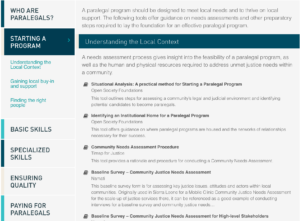The author Toni Morrison wrote, “if you are free, you need to free somebody else. If you have some power, then your job is to empower somebody else.”
That’s what community paralegals do every day. They walk with people towards justice. We are excited to share two resources describing how paralegals work, and how best to support them.
Guide to Organizing and Working with Community-Based Paralegals
 This new guide by Namati and MyJustice shows how paralegals equip people to know law, use law, and shape law. It closes with a chapter on how organizations can best support the work of paralegals, including recruitment, payment, and training.
This new guide by Namati and MyJustice shows how paralegals equip people to know law, use law, and shape law. It closes with a chapter on how organizations can best support the work of paralegals, including recruitment, payment, and training.
Illustrated with cartoons drawn by a paralegal who’s also an artist, the guide is full of hard-earned, concrete wisdom on questions like: how to facilitate a legal literacy session, how to write an effective complaint letter to an administrative agency, and how to combine multiple cases facing a common blockage into a “mass case.”
Insights and examples in the guide are drawn from ongoing legal empowerment efforts in Myanmar, though these lessons can be applied anywhere.
How to Develop a Community Paralegal Program – An Interactive Guide
 This first-of-its-kind online guide offers a curated set of resources for anyone who wants to design or improve community-based paralegal programs. The guide brings together over 100 text and multimedia resources gathered from across the Legal Empowerment Network.
This first-of-its-kind online guide offers a curated set of resources for anyone who wants to design or improve community-based paralegal programs. The guide brings together over 100 text and multimedia resources gathered from across the Legal Empowerment Network.
Drawing from grassroots experience and research, these resources offer guidance on vital, practical questions, including: why knowledge of local context is crucial to start a community-based paralegal program; how to use legal empowerment across issues such as land, gender, criminal justice, and public health; and how to fundraise to sustain these efforts.
If you put into practice something you learn from one of these resources, or if you have an idea for how to improve them, we’d love to hear from you.
Learning from each other is part of how we build our movement, part of how we walk together towards justice.
This post was originally sent as a mailer to our subscribers.
If you would like to join our mailing list, click here.
